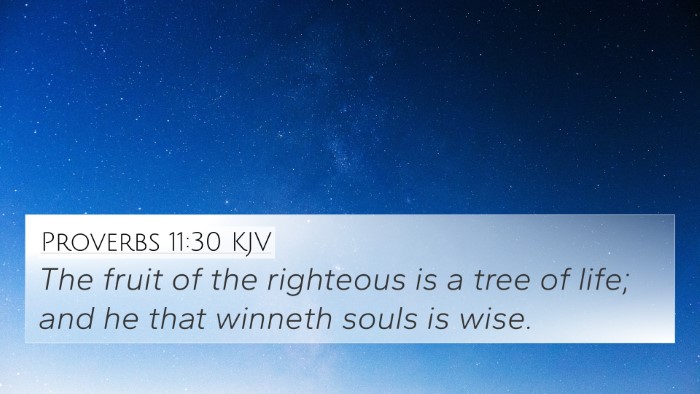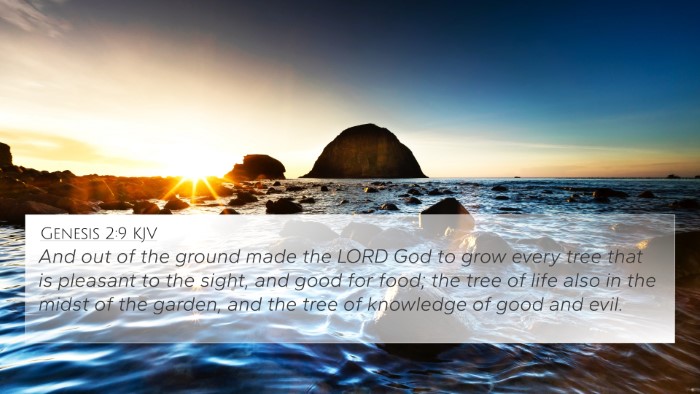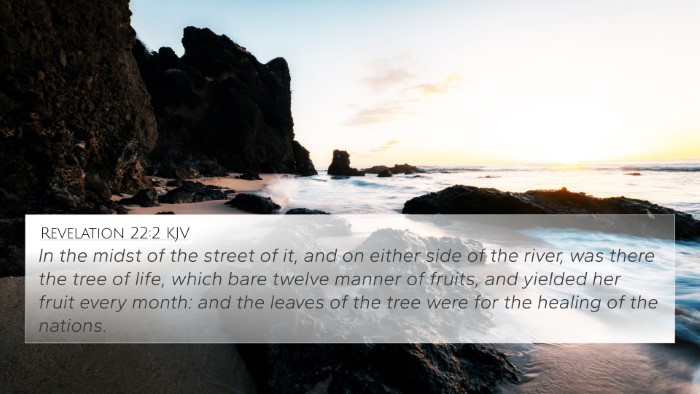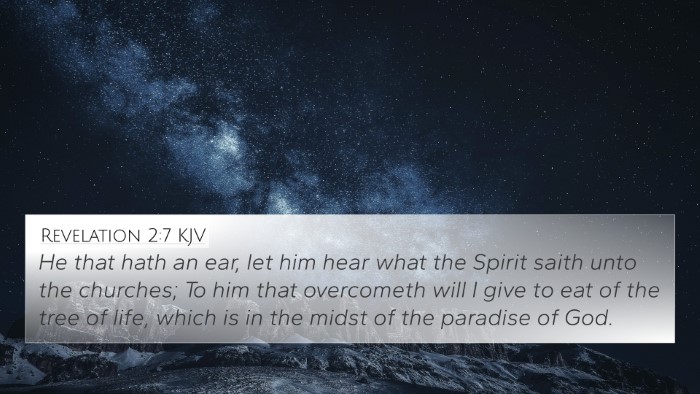Understanding Proverbs 3:18
Proverbs 3:18 states: "She is a tree of life to those who lay hold of her; those who hold her fast are called blessed." This verse encapsulates a profound message about wisdom and its vital role in human life. The term "she" refers to wisdom personified, emphasizing her nurturing and life-giving qualities. Here, we will explore its meaning through insights from public domain commentaries by renowned theologians like Matthew Henry, Albert Barnes, and Adam Clarke, while also highlighting the connections between related Bible verses.
Commentary Insights
Matthew Henry Commentary
Henry explains that wisdom is termed as a "tree of life" because it offers sustenance and everlasting blessings to those who embrace it. He notes the significance of laying hold of wisdom, indicating a proactive approach in seeking and retaining this vital attribute. Those who attain wisdom not only benefit personally but also contribute positively to their community, underscoring the communal aspect of wisdom.
Albert Barnes Commentary
Barnes emphasizes the metaphor of the "tree of life," which evokes visions of vitality and prosperity. He relates wisdom's protective nature, suggesting that it shields individuals from folly and destruction. Holding fast to wisdom leads to both spiritual and material blessings, creating a life characterized by fulfillment and grace. He further connects this verse with the idea that true happiness stems from a life guided by divine wisdom.
Adam Clarke Commentary
Clarke interprets the "tree of life" metaphor as indicative of the everlasting nature of wisdom. He draws parallels between wisdom and various forms of sustenance, suggesting that just as a tree bears fruit, wisdom yields positive results in one's life. Those who cherish wisdom are depicted as "blessed," reflecting God's approval and favor. Clarke encourages readers to actively seek wisdom for a rewarding life.
Cross-References to Proverbs 3:18
Proverbs 3:18 resonates with several other scriptures that emphasize the theme of wisdom:
- Genesis 2:9: "And out of the ground made the Lord God to grow every tree that is pleasant to the sight, and good for food; the tree of life also in the midst of the garden..." - A reference to the Tree of Life, symbolizing life and sustenance.
- Proverbs 11:30: "The fruit of the righteous is a tree of life; and he that winneth souls is wise." - Connecting righteousness and wisdom with life.
- James 1:5: "If any of you lack wisdom, let him ask of God, that giveth to all men liberally, and upbraideth not; and it shall be given him." - Encouraging the pursuit of wisdom through prayer.
- Ecclesiastes 7:12: "For wisdom is a defense, and money is a defense: but the excellency of knowledge is, that wisdom giveth life to them that have it." - Highlighting wisdom as a protector and source of life.
- Proverbs 4:7: "Wisdom is the principal thing; therefore get wisdom: and with all thy getting get understanding." - Reinforcing the value of actively seeking wisdom.
- Proverbs 9:10: "The fear of the Lord is the beginning of wisdom: and the knowledge of the holy is understanding." - Establishing the foundational role of reverence for God in acquiring wisdom.
- Proverbs 16:22: "Understanding is a wellspring of life unto him that hath it: but the instruction of fools is folly." - Showing the life-giving power of understanding and wisdom.
Connections Between Bible Verses
The connections between these verses reveal a thematic continuity concerning the nature of wisdom and its effects on life:
- Contextually, Proverbs 3:18 and Genesis 2:9 both illustrate life-giving entities symbolic of wisdom.
- Proverbs 11:30 and Proverbs 3:18 both depict wisdom as a source of righteous fruitfulness, enhancing individual and communal well-being.
- James 1:5 introduces the importance of seeking wisdom from God, aligning with Proverbs 4:7's imperative to acquire wisdom as a primary goal.
Comparative Bible Verse Analysis
The comparative study of these verses provides deeper insights into the holistic understanding of wisdom:
- Inter-Biblical Dialogue: Proverbs teaches that wisdom not only impacts an individual but also their surroundings, as seen in other texts that echo this sentiment, such as Ecclesiastes.
- Thematic Connections: The recurring themes in the verses studied suggest that wisdom is crucial for both spiritual fulfillment and practical living.
- Cross-Referencing Biblical Texts: By examining the interrelations of these verses, one can see how wisdom is a core principle across both the Old and New Testaments.
Practical Application for Bible Study
For those seeking to deepen their understanding of wisdom through the Bible, utilizing a Bible cross-reference guide can significantly enhance the study experience. Here are several tips on how to effectively apply these insights:
- Use Bible Study Tools: A Bible concordance can help identify connections between verses and themes.
- Engage in Cross-reference Bible Study: Develop a practice of linking related verses to see the broader biblical narrative.
- Explore Themes: Delve into thematic Bible verse connections, exploring how wisdom interacts with other major biblical principles.
- Identify Old and New Testament Links: Understanding how different books of the Bible interrelate enriches the study process.
- Application in Sermons and Discussions: Use cross-references to prepare sermons or group discussions, allowing for a comprehensive exploration of biblical wisdom.
Conclusion
Proverbs 3:18 provides a rich tapestry of meaning about wisdom's significance in life. By understanding its implications through commentaries and comparing it with related scriptures, we can appreciate the depth of its message. Engaging with wisdom is vital not only for personal growth but also for contributing to the well-being of others. In seeking wisdom, we find a path illuminated by God's blessings.









